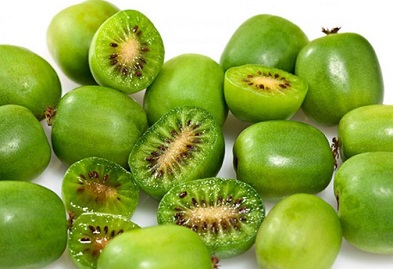Herbs And Phytochemicals: Bioactive Compounds From Kiwiberry Found To Be Useful In Treating Glioblastoma!
Nikhil Prasad Fact checked by:Thailand Medical News Team Apr 29, 2024 1 year, 9 months, 1 week, 18 hours, 43 minutes ago
Herbs And Phytochemicals: Cancer remains a formidable challenge in healthcare, with brain cancer, particularly glioblastoma, posing unique difficulties due to its aggressive nature and limited treatment options. As traditional treatments often fall short in providing satisfactory outcomes, researchers are increasingly turning to natural products and their bioactive compounds for potential therapeutic solutions. Actinidia arguta, commonly known as kiwiberry or sometimes merely referred to as Kiwi fruit, has emerged as one such natural source with promising health benefits, including potential applications in glioblastoma therapy. This
Herbs and Phytochemicals news report is based on a study review conducted by researchers from the Polytechnic of Porto-Portugal and the University of Porto-Portugal and delves into the bioactive composition of A. arguta, its biological properties, and the implications of its use in combating glioblastoma.
 Phytochemicals From Kiwiberry Found To Be Useful In Treating Glioblastoma
Understanding Actinidia arguta
Origins and Cultivation
Phytochemicals From Kiwiberry Found To Be Useful In Treating Glioblastoma
Understanding Actinidia arguta
Origins and Cultivation
Actinidia arguta is a fruit-bearing vine native to Eastern Asia, thriving in regions like eastern China, Japan, and Korea. Its adaptability to various climates has led to its cultivation in diverse parts of the world, including Europe, North America, and New Zealand.
Traditional Medicinal Uses
Various parts of the A. arguta plant, including stems, leaves, flowers, and roots, have a history of use in Asian traditional medicine for their therapeutic properties. However, it is the fruit of A. arguta that has garnered significant attention in recent years due to its rich content of bioactive compounds.
Bioactive Composition of A. arguta
-Phenolic Compounds
A. arguta fruit is abundant in phenolic compounds such as flavonoids (e.g., polymeric procyanidins, kaempferol-3-O-galactoside, quercetin-3-O-rutinoside) and phenolic acids (e.g., neochlorogenic acid, chlorogenic acid, caffeic acid-O-hexoside). These compounds are known for their antioxidant, anti-inflammatory, and potential anti-cancer properties.
-Pigments
The fruit also contains notable levels of pigments, including carotenoids (e.g., lutein, ß-carotene, zeaxanthin) and anthocyanins, contributing to its vibrant colors and antioxidant capacity.
Triterpenoids and Vitamins
-A. arguta exhibits triterpenoids such as asiatic acid, actinidic acid, madecassic acid, and ursolic acid derivatives, along with vitamins, particularly vitamin C. These compounds contribute to its overall health-promoting properties.
Biological Properties and Health Benefits
-Antioxidant and Antifatigue Activities
Studies have demonstrated A. arguta's ant
ioxidant potential, attributed to its high content of vitamin C, flavonoids, and phenolic acids. These compounds scavenge free radicals, reduce oxidative stress, and protect cells from damage. Additionally, the fruit's extracts have shown antifatigue properties, enhancing exercise performance and reducing fatigue-related markers.
-Neuroprotective and Cardiovascular Benefits
The neuroprotective effects of A. arguta extracts are noteworthy, protecting against neurotoxicity induced by high glucose levels and improving cognitive function. Furthermore, consumption of A. arguta has been linked to cardiovascular benefits such as reduced blood pressure and improved lipid profiles.
-Immunomodulatory and Anti-inflammatory Effects
A. arguta extracts modulate immune responses, balancing inflammatory processes and enhancing immune defense mechanisms. They also possess potent anti-inflammatory effects, alleviating inflammation in various conditions.
Anti-cancer Potential and Glioblastoma Therapy
Emerging studies suggest that A. arguta extracts have anti-cancer properties, inhibiting cancer cell proliferation, inducing apoptosis, and demonstrating chemopreventive effects against various cancer types.
Some of the phytochemicals in Kiwi decreased the proliferation of patient-derived glioma initiating cells (GICs) and tumor-organoids but did not affect normal astrocytes. Other phytochemicals in the Kiwiberry were found to effectively inhibits the IL-6-induced STAT-3 signaling pathway in T98G and U87 glioblastoma cells. Some of the phytochemicals present in the Kiwiberry also effectively inhibits the survival of U251 and U87 human glioblastoma cells in combination with TMZ. Other phytochemicals in Kiwi were found to block the production of VEGF and TGF-β in glioblastoma GL-15 cell line, inhibiting angiogenesis.
Some of the bio constituents of Kiwi fruit also affects the behavior of macrophages, which play an important role in fighting cancer. The researchers reported that some of these phytochemicals caused macrophages to shift towards a M1 phenotype, through the increased expression of LPS/IFN-γ, including iNOS, major histocompatibility complex class II (MHC II) and CD11c. This led to increased cell death and inhibition of tumor cell growth.
In the context of glioblastoma therapy, A. arguta's bioactive compounds may modulate cancer cell signaling pathways, provide anti-inflammatory and antioxidant effects, and offer neuroprotective benefits. These mechanisms could potentially inhibit glioblastoma growth and improve treatment outcomes.
Challenges and Future Directions
Challenges such as standardizing bioactive compounds and conducting rigorous clinical trials are crucial to establish the efficacy and safety of A. arguta-based therapies in glioblastoma patients.
Exploring combination approaches with existing glioblastoma treatments and understanding the precise biochemical mechanisms underlying A. arguta's anti-cancer effects will enhance its therapeutic potential.
Conclusion: Harnessing the Potential of Actinidia arguta
Actinidia arguta, with its diverse bioactive compounds and extensive biological properties, holds promise as a potential adjunct therapy in glioblastoma management. Further research, including clinical trials and mechanistic studies, is warranted to fully harness its therapeutic potential and improve outcomes for glioblastoma patients. The integration of natural products like A. arguta into conventional cancer care represents a progressive approach towards personalized and holistic oncology treatments.
The study review was published in the peer reviewed journal: Food Research International.
https://www.sciencedirect.com/science/article/pii/S0963996923013182
For the latest on
Herbs And Phytochemicals, keep on logging to Thailand Medical News.
